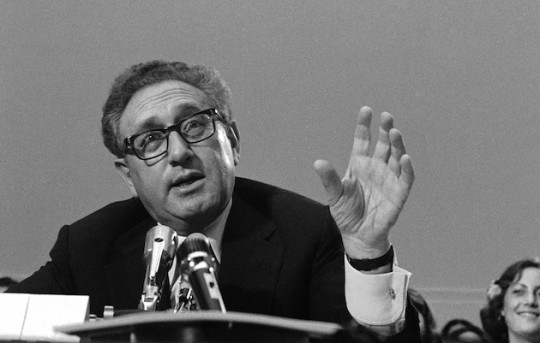Henry Kissinger projects the public image of a judicious elder statesman whose sweeping knowledge of history lets him rise above the petty concerns of today, in order to see what is truly in the national interest. Yet as Kissinger once said of Ronald Reagan, his knowledge of history is "tailored to support his firmly held preconceptions." Instead of expanding his field of vision, Kissinger’s interpretation of the past becomes a set of blinders that prevent him from understanding either his country’s values or its interests. Most importantly, he cannot comprehend how fidelity to those values may advance the national interest.
So far, Kissinger’s aggressive reshaping of the past has escaped public notice. On the contrary, World Order has elicited a flood of fawning praise. The New York Times said, "It is a book that every member of Congress should be locked in a room with — and forced to read before taking the oath of office." The Christian Science Monitor declared it "a treat to gallivant through history at the side of a thinker of Kissinger's caliber." In a review for the Washington Post, Hillary Clinton praised Kissinger for "his singular combination of breadth and acuity along with his knack for connecting headlines to trend lines." The Wall Street Journal and U.K. Telegraph offered similar evaluations.
Kissinger observes that "Great statesmen, however different as personalities, almost invariably had an instinctive feeling for the history of their societies." Correspondingly, the lengthiest component of World Order is a hundred-page survey of American diplomatic history from 1776 to the present. In those pages, Kissinger persistently caricatures American leaders as naïve amateurs, incapable of thinking strategically. Yet an extensive literature, compiled by scholars over the course of decades, paints a very different picture. Kissinger’s footnotes give no indication that he has read any of this work.
If one accepts Kissinger’s narrative at face value, then his advice seems penetrating. "America’s moral aspirations," Kissinger says, "need to be combined with an approach that takes into account the strategic element of policy." This is a cliché masquerading as a profound insight. Regrettably, World Order offers no meaningful advice on how to achieve this difficult balance. It relies instead on the premise that simply recognizing the need for balance represents a dramatic improvement over the black-and-white moralism that dominates U.S. foreign policy.
America’s Original Sin
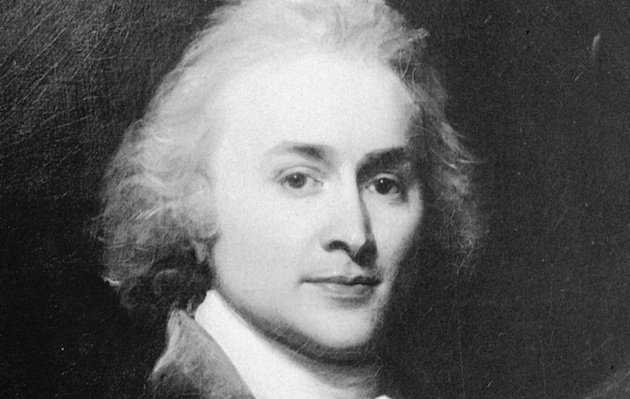
"America’s favorable geography and vast resources facilitated a perception that foreign policy was an optional activity," Kissinger writes. This was never the case. When the colonies were British possessions, the colonists understood that their security was bound up with British success in foreign affairs. When the colonists declared independence, they understood that the fate of their rebellion would rest heavily on decisions made in foreign capitals, especially Paris, whose alliance with the colonists was indispensable.
In passing, Kissinger mentions that "the Founders were sophisticated men who understood the European balance of power and manipulated it to the new country’s advantage." It is easy to forget that for almost fifty years, the new republic was led by its Founders. They remained at the helm through a series of wars against the Barbary pirates, a quasi-war with France begun in 1798, and a real one with Britain in 1812. Only in 1825 did the last veteran of the Revolutionary War depart from the White House—as a young lieutenant, James Monroe had crossed the Delaware with General Washington before being severely wounded.
Monroe turned the presidency over to his Secretary of State, John Quincy Adams. The younger Adams was the fourth consecutive president with prior service as the nation’s chief diplomat. With Europe at peace, the primary concern of American foreign policy became the country’s expansion toward the Pacific Ocean, a project that led to a war with Mexico as well as periodic tensions with the British, the Spanish, and even the Russians, who made vast claims in the Pacific Northwest. During the Civil War, both the Union and Confederacy recognized the vital importance of relations with Europe. Not long after the war, the United States would enter its brief age of overseas expansion.
One of Kissinger’s principal means of demonstrating his predecessors’ naïve idealism is to approach their public statements as unadulterated expressions of their deepest beliefs. With evident disdain, Kissinger writes, "the American experience supported the assumption that peace was the natural condition of humanity, prevented only by other countries’ unreasonableness or ill will." The proof-text for this assertion is John Quincy Adams’ famous Independence Day oration of 1821, in which Adams explained, America "has invariably, often fruitlessly, held forth to [others] the hand of honest friendship, of equal freedom, of generous reciprocity … She has, in the lapse of nearly half a century, without a single exception, respected the independence of other nations." This was a bold assertion, given that Adams was in the midst of bullying Spain on the issue of Florida, which it soon relinquished.
Kissinger spends less than six pages on the remainder of the 19th century, apparently presuming that Americans of that era did not spend much time thinking about strategy or diplomacy. Then, in 1898, the country went to war with Spain and acquired an empire. "With no trace of self-consciousness," Kissinger writes, "[President William McKinley] presented the war…as a uniquely unselfish mission." Running for re-election in 1900, McKinley’s campaign posters shouted, "The American flag has not been planted in foreign soil to acquire more territory, but for humanity’s sake." The book does not mention that McKinley was then fighting a controversial war to subdue the Philippines, which cost as many lives as the war in Iraq and provoked widespread denunciations of American brutality. Yet McKinley’s words—from a campaign ad, no less—are simply taken at face value.
Worshipping Roosevelt and Damning Wilson
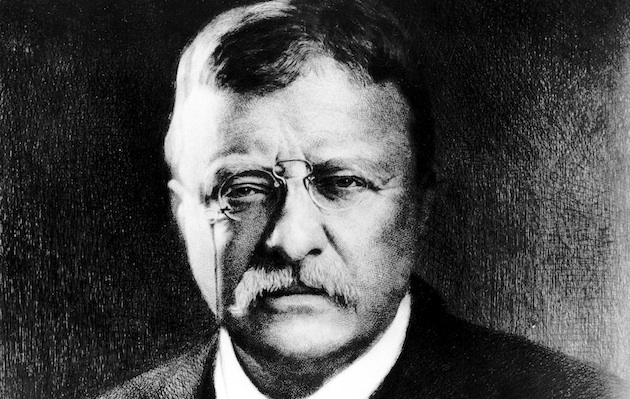
For Kissinger, the presidency of Theodore Roosevelt represents a brief and glorious exception to an otherwise unbroken history of moralistic naïveté. Roosevelt "pursued a foreign policy concept that, unprecedentedly for America, based itself largely on geopolitical considerations." He "was impatient with many of the pieties that dominated American thinking on foreign policy." With more than a hint of projection, Kissinger claims, "In Roosevelt’s view, foreign policy was the art of adapting American policy to balance global power discretely and resolutely, tilting events in the direction of the national interest."
The Roosevelt of Kissinger’s imagination is nothing like the actual man who occupied the White House. Rather than assuming his country’s values to be a burden that compromised its security, TR placed the concept of "righteousness" at the very heart of his approach to world politics. Whereas Kissinger commends those who elevate raison d’etat above personal morality, Roosevelt subscribed to the belief that there is one law for the conduct of both nations and men. At the same time, TR recognized that no authority is capable of enforcing such a law. In world politics, force remains the final arbiter. For Kissinger, this implies that ethics function as a restraint on those who pursue the national interest. Yet according to the late scholar of international relations, Robert E. Osgood, Roosevelt believed that the absence of an enforcer "magnified each nation’s obligation to conduct itself honorably and see that others did likewise." This vision demanded that America have a proverbial "big stick" and be willing to use it.
Osgood’s assessment of Roosevelt is not atypical. What makes it especially interesting is that Osgood was an avowed Realist whose perspective was much closer to that of Kissinger than it was to Roosevelt. In 1969, Osgood took leave from Johns Hopkins to serve under Kissinger on the National Security Council staff. Yet Osgood had no trouble recognizing the difference between Roosevelt’s worldview and his own.
For Kissinger, the antithesis of his imaginary Roosevelt is an equally ahistoric Woodrow Wilson. Wilson’s vision, Kissinger says, "has been, with minor variations, the American program for world order ever since" his presidency. "The tragedy of Wilsonianism," Kissinger explains, "is that it bequeathed to the twentieth century’s decisive power an elevated foreign policy doctrine unmoored from a sense of history or geopolitics." Considering Theodore Roosevelt’s idealism, it seems that Wilson’s tenure represented a period of continuity rather than a break with tradition. Furthermore, although Wilson’s idealism was intense, it was not unmoored from an appreciation of power. To demonstrate Wilson’s naïveté, Kissinger takes his most florid rhetoric at face value, a tactic employed earlier at the expense of William McKinley and John Quincy Adams.
The pivotal moment of Wilson’s presidency was the United States’ declaration of war on Germany. "Imbued by America’s historic sense of moral mission," Kissinger says, "Wilson proclaimed that America had intervened not to restore the European balance of power but to ‘make the world safe for democracy’." In addition to misquoting Wilson, Kissinger distorts his motivations. In his request to Congress for a declaration of war, Wilson actually said, "The world must be made safe for democracy." John Milton Cooper, the author of multiple books on Wilson, notes that Wilson employed the passive tense to indicate that the United States would not assume the burden of vindicating the cause of liberty across the globe. Rather, the United States was compelled to defend its own freedom, which was under attack from German submarines, which were sending American ships and their crewmen to the bottom of the Atlantic. (Kissinger makes only one reference to German outrages in his discussion.)
If Wilson were the crusader that Kissinger portrays, why did he wait almost three years to enter the war against Germany alongside the Allies? The answer is that Wilson was profoundly apprehensive about the war and it consequences. Even after the Germans announced they would sink unarmed American ships without warning, Wilson waited two more months, until a pair of American ships and their crewmen lay on the ocean floor as a result of such attacks.
According to Kissinger, Wilson’s simple faith in the universality of democratic ideals led him to fight, from the first moments of the war, for regime change in Germany. In his request for a declaration of war, Wilson observed, "A steadfast concert for peace can never be maintained except by a partnership of democratic nations. No autocratic government could be trusted to keep faith within it or observe its covenants." This was more of an observation than a practical program. Eight months later, Wilson asked for a declaration of war against Austria-Hungary, yet explicitly told Congress, "we do not wish in any way to impair or to rearrange the Austro-Hungarian Empire. It is no affair of ours what they do with their own life, either industrially or politically." Clearly, in this alleged war for liberty, strategic compromises were allowed, something one would never know from reading World Order.
Taking Ideology Out of the Cold War

Along with the pomp and circumstance of presidential inaugurations, there is plenty of inspirational rhetoric. Refusing once again to acknowledge the complex relationship between rhetoric and reality, Kissinger begins his discussion of the Cold War with an achingly literal interpretation of John F. Kennedy’s inaugural address, in which he called on his countrymen to "pay any price, bear any burden, support any friend, oppose any foe, in order to assure the survival and the success of liberty." Less well known is Kennedy’s admonition to pursue "not a balance of power, but a new world of law," in which a "grand and global alliance" would face down "the common enemies of mankind."
Kissinger explains, "What in other countries would have been treated as a rhetorical flourish has, in American discourse, been presented as a specific blueprint for global action." Yet this painfully naïve JFK is—like Kissinger’s cartoon versions of Roosevelt or Wilson—nowhere to be found in the literature on his presidency.
In a seminal analysis of Kennedy’s strategic thinking published more than thirty years ago, John Gaddis elucidated the principles of JFK’s grand strategy, which drew on a careful assessment of Soviet and American power. Gaddis concludes that Kennedy may have been willing to pay an excessive price and bear too many burdens in his efforts to forestall Soviet aggression, but there is no question that JFK embraced precisely the geopolitical mindset that Kissinger recommends. At the same time, Kennedy comprehended, in a way Kissinger never does, that America’s democratic values are a geopolitical asset. In Latin America, Kennedy fought Communism with a mixture of force, economic assistance, and a determination to support elected governments. His "Alliance for Progress" elicited widespread applause in a hemisphere inclined to denunciations of Yanquí imperialism. This initiative slowly fell apart after Kennedy’s assassination, but he remains a revered figure in many corners of Latin America.
Kissinger’s fundamental criticism of the American approach to the Cold War is that "the United States assumed leadership of the global effort to contain Soviet expansionism—but as a primarily moral, not geopolitical endeavor." While admiring the "complex strategic considerations" that informed the Communist decision to invade South Korea, Kissinger laments that the American response to this hostile action amounted to nothing more than "fighting for a principle, defeating aggression, and a method of implementing it, via the United Nations."
It requires an active imagination to suppose that President Truman fought a war to vindicate the United Nations. He valued the fig leaf of a Security Council resolution (made possible by the absence of the Soviet ambassador), but the purpose of war was to inflict a military and psychological defeat on the Soviets and their allies, as well as to secure Korean freedom. Yet Kissinger does not pause, even for a moment, to consider that the United States could (or should) have conducted its campaign against Communism as both a moral and a geopolitical endeavor.
An admission of that kind would raise the difficult question of how the United States should integrate both moral and strategic imperatives in its pursuit of national security. On this subject, World Order has very little to contribute. It acknowledges that legitimacy and power are the prerequisites of order, but prefers to set up and tear down an army of strawmen rather than engaging with the real complexity of American diplomatic history.
Forgetting Reagan
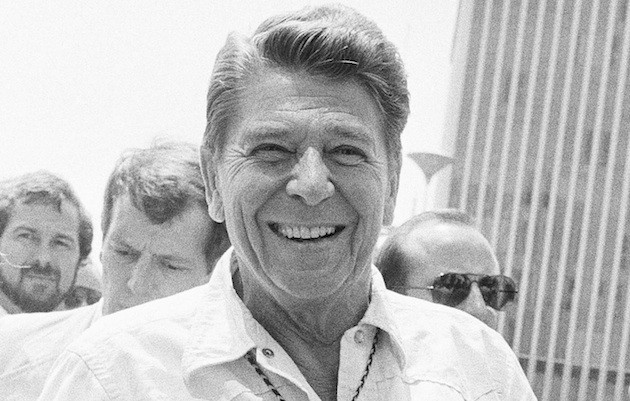
In 1976, while running against Gerald Ford for the Republican nomination, Ronald Reagan "savaged" Henry Kissinger for his role as the architect of Nixon and Ford’s immoral foreign policy. That is how Kissinger recalled things twenty years ago in Diplomacy, his 900-page treatise on world politics in the 20th century. Not surprisingly, Kissinger employed a long chapter in his book to return the favor. Yet in World Order, there is barely any criticism to leaven its praise of Reagan. Perhaps this change reflects a gentlemanly concern for speaking well of the dead. More likely, Kissinger recognizes that Reagan’s worldview has won the heart of the Republican Party. Thus, to preserve his influence, Kissinger must create the impression he and Reagan were not so different.
In Diplomacy, Kissinger portrays Reagan as a fool and an ideologue. "Reagan knew next to no history, and the little he did know he tailored to support his firmly held preconceptions. He treated biblical references to Armageddon as operational predictions. Many of the historical anecdotes he was so fond of recounting had no basis in fact." In World Order, one learns that Reagan "had read more deeply in American political philosophy than his domestic critics credited" him with. Thus, he was able to "combine American’s seemingly discordant strengths: its idealism, its resilience, its creativity, and its economic vitality." Just as impressively, "Reagan blended the two elements—power and legitimacy" whose combination Kissinger describes as the foundation of world order.
Long gone is the Reagan who was bored by "the details of foreign policy" and whose "approach to the ideological conflict [with Communism] was a simplified version of Wilsonianism" while his strategy for ending the Cold War "was equally rooted in American utopianism." Whereas Nixon had a deep understanding of the balance of power, "Reagan did not in his own heart believe in structural or geopolitical causes of tension."
In contrast, World Order says that Reagan "generated psychological momentum with pronouncements at the outer edge of Wilsonian moralism." Alone among American statesmen, Reagan receives credit for the strategic value of his idealistic public statements, instead of having them held up as evidence of his ignorance and parochialism.
Kissinger observes that while Nixon did not draw inspiration from Wilsonian visions, his "actual policies were quite parallel and not rarely identical" to Reagan’s. This statement lacks credibility. Reagan wanted to defeat the Soviet Union. Nixon and Kissinger wanted to stabilize the Soviet-American rivalry. They pursued détente, whereas Reagan, according to Diplomacy, "meant to reach his goal by means of relentless confrontation."
Kissinger’s revised recollections of the Reagan years amount to a tacit admission that a president can break all of the rules prescribed by the Doctor of Diplomacy, yet achieve a more enduring legacy as a statesman than Kissinger himself.
The Rest of the World
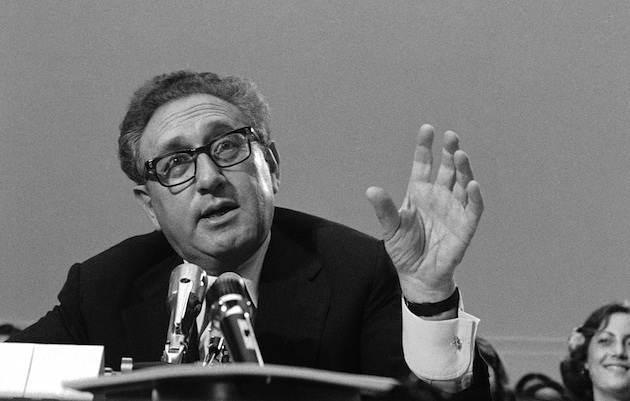
Three-fourths of World Order is not about the United States of America. The book also includes long sections on the history of Europe, Islam, and Asia. The sections on Islam and Asia are expendable, although for different reasons.
The discussion of Islamic history reads like a college textbook. When it comes to the modern Middle East, World Order has the feel of a news clipping service, although the clippings favor the author’s side of the debate. In case you didn’t already know, Kissinger is pro-Israel and pro-Saudi, highly suspicious of Iran, and dismissive of the Arab Spring. The book portrays Syria as a quagmire best avoided, although it carefully avoids criticism of Obama’s plan for airstrikes in 2013. Kissinger told CNN at the time that the United States ought to punish Bashar al-Assad for using chemical weapons, although he opposed "intervention in the civil war."
The book’s discussion of China amounts to an apologia for the regime in Beijing. To that end, Kissinger is more than willing to bend reality. When he refers to what took place in Tiananmen Square in 1989, he calls it a "crisis"—not a massacre or an uprising. Naturally, there are no references to political prisoners, torture, or compulsory abortion and sterilization. There is a single reference to corruption, in the context of Kissinger’s confident assertion that President Xi Jinping is now challenging it and other vices "in a manner that combines vision with courage."
Whereas Kissinger’s lack of candor is not surprising with regard to human rights, one might expect an advocate of realpolitik to provide a more realistic assessment of how China interacts with foreign powers. Yet the book only speaks of "national rivalries" in the South China Sea, not of Beijing’s ongoing efforts to intimidate its smaller neighbors. It also portrays China as a full partner in the effort to denuclearize North Korea. What concerns Kissinger is not the ruthlessness of Beijing, but the potential for the United States and China to be "reinforced in their suspicions by the military maneuvers and defense programs of the other."
Rather than an aggressive power with little concern for the common good, Kissinger’s China is an "indispensable pillar of world order" just like the United States. If only it were so.
In its chapters on Europe, World Order recounts the history that has fascinated Kissinger since his days as a doctoral candidate at Harvard. It is the story of "the Westphalian order," established and protected by men who understood that stability rests on a "balance of power—which, by definition, involves ideological neutrality"—i.e. a thorough indifference to the internal arrangements of other states.
"For more than two hundred years," Kissinger says, "these balances kept Europe from tearing itself to pieces as it had during the Thirty Years War." To support this hypothesis, Kissinger must explain away the many great wars of that era as aberrations that reflect poorly on particular aggressors—like Louis XIV, the Jacobins, and Napoleon—rather than failures of the system as a whole. He must even exonerate the Westphalian system from responsibility for the war that crippled Europe in 1914. But this he does, emerging with complete faith that balances of power and ideological neutrality remain the recipe for order in the 21st century.
Wishing Away Unipolarity

Together, Kissinger’s idiosyncratic interpretations of European and American history have the unfortunate effect of blinding him to the significance of the two most salient features of international politics today. The first is unipolarity. The second is the unity of the democratic world, led by the United States.
Fifteen years ago, Dartmouth Professor William Wohlforth wrote that the United States "enjoys a much larger margin of superiority over the next powerful state or, indeed, all other great powers combined, than any leading state in the last two centuries." China may soon have an economy of comparable size, but it has little prospect of competing militarily in the near- or mid-term future. Six of the next ten largest economies belong to American allies. Only one belongs to an adversary—Vladimir Putin’s Russia—whose antipathy toward the United States has not yielded a trusting relationship with China, let alone an alliance. (Incidentally, Putin is not mentioned in World Order, a significant oversight for a book that aspires to a global field of vision.)
The reason that the United States is able to maintain a globe-spanning network of alliances is precisely because it has never had a foreign policy based on ideological neutrality. Its network of alliances continues to endure and expand, even in the absence of a Soviet threat, because of shared democratic values. Of course, the United States has partnerships with non-democratic states as well. It has never discarded geopolitical concerns, pace Kissinger. Yet the United States and its principal allies in Europe and Asia continue to see their national interests as compatible because their values play such a prominent role in defining those interests. Similarly, America’s national interest entails a concern for spreading democratic values, because countries that make successful transitions to democracy tend to act in a much more pacific and cooperative manner.
These are the basic truths about world order that elude Kissinger because he reflexively exaggerates and condemns the idealism of American foreign policy. In World Order, Kissinger frequently observes that a stable order must be legitimate, in addition to reflecting the realities of power. If he were less vehement in his denunciations of American idealism, he might recognize that it is precisely such ideals that provide legitimacy to the order that rests today on America’s unmatched power.
Rather than functioning as a constraint on its pursuit of the national interest, America’s democratic values have ensured a remarkable tolerance for its power. Criticism of American foreign policy may be pervasive, but inaction speaks louder than words. Rather than challenging American power, most nations rely on it to counter actual threats. At the moment, with the Middle East in turmoil, Ukraine being carved up, and Ebola spreading rapidly, the current world order may not seem so orderly. Yet no world order persists on its own. Those who have power and legitimacy must fight to preserve it.
